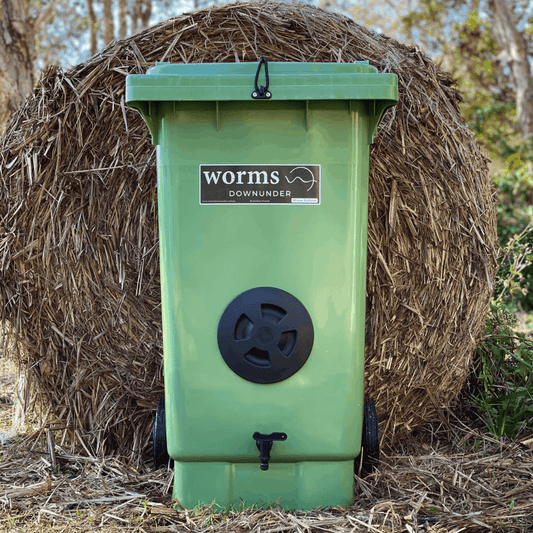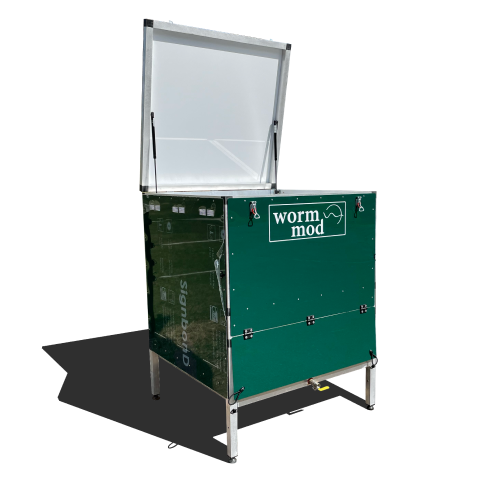Often referred to as ‘black gold’, vermicast is a highly valuable soil amendment that improves soil health and fertility, increases the nutrient content and microbial life, improves water retention and reduces the need for fertilisers and pesticides. It also contains plant enzymes and plant growth hormones (courtesy of the unique set of microorganisms found in the worms gut!) and helps plants resist attacks by pathogens, insects and parasitic nematodes. No wonder ‘old school’ growers have used it for generations!
Conventional composting (sans worms) is a thermophilic process using microorganisms to break down natural waste, mostly at high temperatures. Hence why your worms wouldn’t enjoy being chucked into a compost heap – sadly they would sizzle! Composting can be performed in both anaerobic or aerobic conditions. If given enough access to oxygen by turning frequently (get your pitch-fork out!), the compost will remain in an aerobic state. However, if too much moisture is introduced, or it is not aerated enough an anaerobic state will arise. If there’s a not-so-nice smell coming from your compost pile, this is probably the cause.
So why is vermicomposting a gamechanger for us and so many others?
Gamechanger No.1 – Get your hands on the ‘Black Gold’ twice as fast
Vermicomposting takes around half the time of the conventional composting. It can actually speed up the decomposition process by 2-5 times and produces a finer, more homogenous compost compared to thermophilic composting. So, for busy or just plain impatient people (like us), it is gold.
Gamechanger No. 2 – Less work for you (heaps more work for worms!)
Now this is where vermicomposting really struts its stuff, as your very own worm-workforce does all the heavy lifting by aerating all day every day with no complaints. So, you don’t have to spend your weekends turning over the compost pile (again and again!) as with conventional composting. Just make sure you either buy or breed-up enough worms to match your processing requirements.
Gamechanger No. 3 – No nasty smells and produces less greenhouse gases
From a green-house-gas perspective, managing your household waste by vermicomposting does not produce methane because methane-producing microbes are not active in the presence of oxygen. In addition, as long as you follow our simple worm farming tips, your worm farm will smell lovely like a rainforest floor. On the other hand, composting in anaerobic conditions not only smells bad, it releases methane into the atmosphere which is approximately 25-30 times more potent than carbon dioxide as a greenhouse gas. Many people don’t realise that this is exactly what happens when we chuck our kitchen scraps in the bin and they end up buried in landfill.
Gamechanger No. 4 – Nothing beats the ‘magic’ of the worm’s gut
Scientists are still trying to understand the unique microbiome within a worms gut. Worms mechanically mix mineral particles and organic matter through their digestive system and amazingly can increase or decrease the activity and number of beneficial or pathogenic microorganisms as required by nature! The disease-causing E-coli bacteria completely disappears when processed by worms – pretty amazing stuff.
What scientists do know is that the unique microbes in vermicast are the secret to important soil processes such as denitrification, nitrification, nitrogen fixation, methane oxidation, growth hormone production, phosphorous solubilisers and control of microbial pathogens.
Gamechanger No. 5 – You can vermicompost anywhere!
Vermicomposting can be done outside, inside and in small spaces like apartments or on a large industrial scale. Conventional composting tends to need a lot more space and can be messier (when aerating etc) so is mostly undertaken outside. It is our aim at WDU to make vermicomposting solutions accessible to as many people as possible across a variety of applications.
So, conventional composting and vermicomposting are both excellent solutions for reducing organic waste in landfill and returning organic matter back into the soil. We love both, but we reckon you can’t beat the awesome benefits of working with worms!



